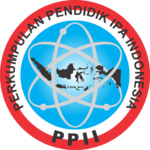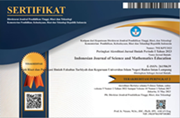Hydrocarbon and Petroleum with SETS Approach Module to Train Students’ Critical Thinking Skills
Abstract
The aim of this study was to develop a module with the Science, Environment, Technology and Society (SETS) approach to train critical thinking skills on hydrocarbons and petroleum using the Research and Development (R and D) method. This development modul was validated by 3 experts, while the limited trial was only limited to a small trial with 3 respondents from class XII students of SMAN 10 Surabaya to obtain practical and effective data of modules that developed on a small scale. This experiment obtained expert validation results 87% with the “very valid” category, module practicality 94% with the “very practical” category and module effectiveness of 0.8 with the “high” category. The effectiveness of the module is obtained from the pretest and posttest that 3 students have increased their critical thinking skills after the module is given. Based on this study, it can be concluded that the module with the SETS approach in the material of hydrocarbons and petroleum can train students’ critical thinking skills and it is feasible to be tested on larger respondents.
Keywords
Full Text:
PDFReferences
L. Mutakinati, I. Anwari, and K. Yoshisuke, “Analysis of Students’ Critical Thinking Skill of Middle School Through STEM Education Project-Based Learning,” J. Pendidik. IPA Indones., vol. 7, no. 1, pp. 54–65, 2018, doi: 10.15294/jpii.v7i1.10495.
N. R. Dewi, L. Magfiroh, S. Nurkhalisa, and I. Dwijayanti, “The Development of Contextual-Based Science Digital Storytelling Teaching Materials to Improve Students’ Critical Thinking on Classification Theme,” J. Turkish Sci. Educ., vol. 16, no. 3, pp. 364–378, 2019, doi: 10.12973/tused.10288a.
S. Marni, “Students ‘ Critical Thinking Skills Based on Gender And Knowledge Group,” J. Turkish Sci. Educ., vol. 17, no. 4, pp. 544–560, 2020, doi: 10.36681/tused.2020.44.
R. Mataniari, J. Willison, M. H. E. Hasibuan, U. Sulistiyo, and F. Dewi, “Portraying Students’ Critical Thinking Skills through Research Skill Development (RSD) Framework: A Case of a Biology Course in an Indonesian University,” J. Turkish Sci. Educ., vol. 17, no. 2, pp. 302–314, 2020, doi: 10.36681/tused.2020.28.
F. Fakhriyah, “Penerapan Problem Based Learning dalam Upaya Mengembangkan Kemampuan Berpikir Kritis Mahasiswa,” J. Pendidik. IPA Indones., vol. 3, no. 1, pp. 95–101, 2014, doi: 10.15294/jpii.v3i1.2906.
A. Anisa, “Meningkatkan Keterampilan Berpikir Kritis Peserta Didik Melalui Pembelajaran IPA Berbasis Potensi Lokal Jepara,” J. Inov. Pendidik. IPA, vol. 3, no. 1, p. 1, 2017, doi: 10.21831/jipi.v3i1.8607.
S. Syarifah and Y. Sumardi, “Pengembangan Model Pembelajaran Malcolm’S Modeling Untuk Meningkatkan Keterampilan Berpikir Kritis Dan Motivasi Belajar Siswa,” J. Inov. Pendidik. IPA, vol. 1, no. 2, p. 237, 2015, doi: 10.21831/jipi.v1i2.7510.
I. W. Redhana, “Model Pembelajaran Berbasis Masalah dan Pertanyaan Socratik untuk Meningkatkan Keterampilan Berpikir Kritis Siswa,” J. Cakrawala Pendidik., no. 3, pp. 351–365, 2013, doi: 10.21831/cp.v0i3.1136.
A. Abdurrahman, C. A. Setyaningsih, and T. Jalmo, “Implementating Multiple Representation-based Worksheet to Develop Critical Thinking Skills,” J. Turkish Sci. Educ., vol. 16, no. 1, pp. 138–155, 2019, doi: 10.12973/tused.10271a.
M. Firdaus and I. Wilujeng, “Pengembangan LKPD Inkuiri Terbimbing untuk Meningkatkan Keterampilan Berpikir Kritis dan Hasil Belajar Peserta Didik,” J. Inov. Pendidik. IPA, vol. 4, no. 1, pp. 26–40, 2018.
A. Azar, “The effect of critical thinking dispositions on students achievement in selection and placement exam for university in Turkey,” J. Turkish Sci. Educ., vol. 7, no. 1, pp. 61–73, 2010.
M. A. Prayitno, N. K. Dewi, and N. Wijayati, “Pengembangan Modul Pembelajaran Kimia Bervisi Sets Berorientasi Chemo-Entrepreneurship (Cep) Pada Materi Larutan Asam Basa,” J. Inov. Pendidik. Kim., vol. 10, no. 1, 2016.
M. Imaduddin and F. F. Hidayah, “Redesigning Laboratories for Pre-service Chemistry Teachers: From Cookbook Experiments to Inquiry-Based Science, Environment, Technology, and Society Approach,” J. Turkish Sci. Educ., vol. 16, no. 4, pp. 489–507, 2019, doi: 10.36681/tused.2020.3.
N. Yörük, I. Morgil, and N. Seçken, “The Effects of Science, Technology, Ssociety, Environment (STSE) Interactions on Ceaching chemistry,” Nat. Sci., vol. 02, no. 12, pp. 1417–1424, 2010, doi: 10.4236/ns.2010.212173.
B. I. . Rosario, “Science, Technology, Society, and Environment (STSE) Approach in Environment Science for Nonscience Student in a Local Culture,” Liceo J. High. Educ. Res. Sci. Technol. Sect., vol. 6, pp. 268–283, 2009.
U. Maghfiroh and Sugianto, “Penerapan Pembelajaran Fisika Bervisi Sets Untuk Meningkatkan Kemampuan Berpikir Analitis Peserta Didik Kelas X,” J. Pendidik. Fis. Indones., vol. 7, no. 1, pp. 6–12, 2011, doi: 10.15294/jpfi.v7i1.1061.
Firdaus, “Pengembangan Media Pembelajaran Bervisi SETS Berbantuan Komputer untuk Meningkatkan Keterampilan Pemecahan Masalah,” Indones. J. Sci. Educ. Indones. J. Sci. Educ., vol. 1, no. 30286, pp. 17–29, 2017.
A. C. Yusro, “Pengembangan Perangkat Pembelajaran Fisika Berbasis SETS Untuk Meningkatkan Kemampuan Berpikir Kreatif Siswa,” J. Pendidik. Fis. dan Keilmuan, vol. 1, no. 2, p. 61, 2017, doi: 10.25273/jpfk.v1i2.13.
A. Fatchan, H. Soekamto, and Y. Yuniarti, “Pengaruh Model Pembelajaran Science, Environment, Technology, Society (SETS) Terhadap Kemampuan Berkomunikasi Secara Tertulis Berupa Penulisan Karya Ilmiah Bidang Geografi Siswa SMA,” J. Pendidik. dan Pembelajaran, vol. 21, no. 1, pp. 33–40, 2014.
M. Zahra, W. Wati, and D. Makbuloh, “Pembelajaran SETS (Science, Environment, Technology, Society): Pengaruhnya pada Keterampilan Proses Sains,” Indones. J. Sci. Math. Educ., vol. 2, no. 3, pp. 320–327, 2019, doi: 10.24042/ijsme.v2i3.4357.
C. Damayanti, A. Rusilowati, and S. Linuwih2, “Pengembangan Model Pembelajaran Larutan Penyangga Berbasis Masalah Bervisi SETS,” J. Innov. Sci. Educ., vol. 6, no. 1, 2017.
D. E. Avci, N. S. Onal, and M. Usak, “Turkish Teachers ‘ Opınıons about Science-Technology- Acquisitions in Science and Technology Course Curriculum,” J. Balt. Sci. Educ., vol. 13, no. 2, pp. 216–231, 2014.
A. Resni, S. Yamtinah, and S. B. Utomo, “Penggunaan Pendekatan SETS (Science, Environment, Technology and Society) pada Pembelajaran Asam, Basa, dan Garam untuk Meningkatkan Minat Belajar, Rasa Ingin Tahu, dan Prestasi Belajar Peserta Didik Kelas VII A Semester I SMP N 3 Karanganyar,” J. Pendidik. Kim. Univ. Sebel. Maret, vol. 2, no. 3, pp. 108–113, 2013.
D. Rosana, N. Kadarisman, and I. G. P. Suryadarma, “SSETS Best Practice Model: Growth Optimization and Productivity of Organic Food Plants through Iasmuspec Application,” J. Pendidik. IPA Indones., vol. 8, no. 2, pp. 267–278, 2019, doi: 10.15294/jpii.v8i2.19248.
U. Hasanah, “Validity of SALINGTEMAS Based-Worksheet on Fungi Topic to Influence Critical Thinking Skill,” BioEdu, vol. 8, no. 3, pp. 20–25, 2019.
Pramesthi and A. Dewi, “The Implementation of Student Worksheet Based on SALINGTEMAS Approach on Ecosystem Topic to Practice Critical Thinking Skills Students,” BioEdu, vol. 2507, no. 1, pp. 1–9, 2020.
S. & R. Fitra Fadliani, “Development of Student Worksheet (SWs) Based on SETS (Science, Environment, Technology And Society) of Chemical Equilibrium,” J. Online Mhs., vol. 7, pp. 1–12, 2020.
A. Anggraini and S. Sukardi, “Pengembangan Modul Prakarya Dan Kewirausahaan Materi Pengolahan Berbasis Product Oriented Bagi Peserta Didik Smk,” J. Pendidik. Vokasi, vol. 5, no. 3, p. 287, 2015, doi: 10.21831/jpv.v5i3.6484.
L. Puspita, “Pengembangan Modul Berbasis Keterampilan Proses Sains sebagai Bahan Ajar dalam Pembelajaran Biologi,” J. Inov. Pendidik. IPA, vol. 5, no. 1, pp. 79–88, 2019, doi: 10.21831/jipi.v5i1.22530.
Ri. Agustini, “Pengembangan Multimedia Interaktif Teknik Jahit Perca Kelas X Desain Kriya Tekstil SMK Negeri 2 Sewon,” J. Pendidik. Kiriya, 2016.
S. A. Sadiman, Skala Pengukuran Variabel-Variabel Penelitian. Depok: Raja Grafindo Persada, 2005.
I. K. Setiawati and Senam, “Pengembangan Perangkat Pembelajaran IPA Berbasis SETS untuk Meningkatkan Scientific Literacy dan Foundational Knowledge,” J. Inov. Pendidik. IPA, vol. 1, no. 2, p. 178, 2015, doi: 10.21831/jipi.v1i2.7503.
Esmiyanti, S. Haryani, and E. Purwantoyo, “Pengembangan Modul IPA Terpadu Bervisi SETS (Science, Environment, Technology, and Society) pada Tema Ekosistem,” Pengemb. Modul ipa terpadu bervisi SETS (science, Environ. Technol. Soc. pada tema Ekosist., vol. 5, no. 3, pp. 1418–1423, 2016.
P. Amita, T. Prasasti, and I. Listiani, “SETS-Based Guided Experiment Book : Empowering Science Process Skills of Elementary School Students,” Indones. J. Biol. Educ., vol. 4, no. 3, pp. 257–262, 2018.
H. Sofyan, Pedoman Pengembangan Bahan Ajar, A Sudijono. Yogyakarta: IKIP Yogyakarta: Raja Grafindo Persada, 2008.
A. Cahyarini and S. Rahayu, “The Effect Of 5e Learning Cycle Instructional Model Using Socioscientific Issues ( SSI ) Learning Context on Students ‘ Critical Thinking,” J. Pendidik. IPA Indones., vol. 5, no. 2, pp. 222–229, 2016, doi: 10.15294/jpii.v5i2.7683.
H. Suwono, H. E. Pratiwi, H. Susanto, and H. Susilo, “Enhancement of Students ‘ Biological Literacy and Critical Thinking of Biology Through Socio-Biological,” J. Pendidik. IPA Indones., vol. 6, no. 2, 2017, doi: 10.15294/jpii.v6i2.9622.
R. M. Vieira and C. Tenreiro-vieira, “Fostering Scientific Literacy and Critical Thinking in Elementary Science Education,” Int. J. Sci. Math. Educ., pp. 659–680, 2016, doi: 10.1007/s10763-014-9605-2.
M. Frank and A. Barzilai, “Project-Based Technology: Instructional Strategy for Developing Technological Literacy,” J. Technol. Educ., vol. 18, no. 1, pp. 39–53, 2006, doi: 10.21061/jte.v18i1.a.3.
F. P. Setiyono, “Pengembangan Perangkat Pembelajaran Kimia Kelarutan dan Hasil Kali Kelarutan (Ksp) dengan Pendekatan SETS untuk Meningkatkan Kreativitas dan Hasil Belajar Peserta Didik,” J. Educ. Res. Eval., vol. 1, no. 1, pp. 149–158, 2012.
A. Sugiarto and D. Djukri, “Pembelajaran Berbasis SETS Sebagai Upaya Meningkatkan Kreativitas dalam Pemecahan Masalah Pencemaran Lingkungan,” J. Inov. Pendidik. IPA, vol. 1, no. 1, p. 1, 2015, doi: 10.21831/jipi.v1i1.4527.
A. Rahmi, Y. Yusrizal, and I. Maulana, “Pengembangan Bahan Ajar Modul Pada Materi Hidrokarbon Di SMA Negeri 11 Banda Aceh,” J. Pendidik. Sains Indones., vol. 2, no. 1, pp. 12–26, 2014.
DOI: http://dx.doi.org/10.24042/ijsme.v4i1.7839
Refbacks
- There are currently no refbacks.
Copyright (c) 2021 Unit Riset dan Publikasi Ilmiah FTK UIN Raden Intan Lampung

This work is licensed under a Creative Commons Attribution-ShareAlike 4.0 International License.

Indonesian Journal of Science and Mathematics Education is licensed under a Creative Commons Attribution-ShareAlike 4.0 International License.




